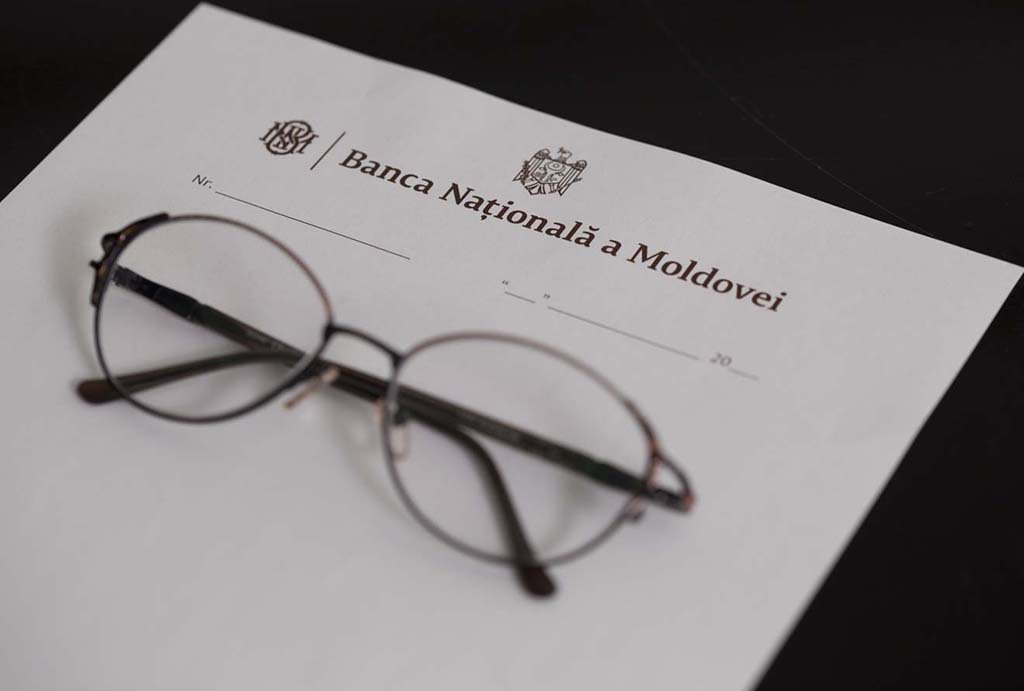Welcome to the official website of the National Bank of Moldova!
×
Do you have good eyesight and want to turn this tool off?
Do you have good eyesight and want to turn this tool off?
Schedule of reception of citizens by the Executive Board of the National Bank of Moldova.
The registration of applicants for an audience is carried out based on a written request on the subject addressed.
Anca Dragu, Governor
1st Wednesday of the month: 14.00-16.00.
Petru Rotaru, First Deputy Governor
2nd Wednesday of the month: 14.00-16.00.
Tatiana Ivanicichina, Deputy Governor
3rd Wednesday of the month: 14.00-16.00.
Constantin Șchendra, Deputy Governor
4th Wednesday of the month: 14.00-16.00.
Mihnea Constantinescu, Deputy Governor
5th Wednesday of the month: 14.00-16.00.
Welcome to the official website of the National Bank of Moldova!
If you want to send a message (question or suggestion) on-line, go to section "Feedback" from the main menu at the top of the website.
You can choose one of the most popular reports from the list:

National Bank and the members of its decision-making bodies shall be independent in exercising the tasks conferred upon them by law, and shall neither seek nor take instructions from public authorities or from any other authority.

In order to ensure and maintain price stability over the medium term, the National Bank’s aim will be to keep inflation (measured by Consumer Price Index) at the level of 5.0 percent annually with a possible deviation of ± 1.5 percentage points, considered to be optimal for growth and development of Moldova's economy over the medium-term.

Financial stability is achieved by strengthening the resilience of the financial system, limiting the contagion effect and reducing the accumulation of systemic risks, thus contributing to the sustainability of the financial sector and economic growth.

National Bank shall have the exclusive right to issue on the territory of the Republic of Moldova banknotes and coins as legal tender, as well as commemorative and jubilee banknotes and coins as legal tender and for numismatic purposes.

National Bank is exclusively responsible for the licencing, supervision and regulation of financial institutions activity.

National Bank of Moldova acts as banker and fiscal agent of the State and shall receive from state bodies economic and financial information and documents, which are necessary for carrying out its tasks.

National Bank of Moldova is an autonomous public legal entity and is responsible to the Parliament.

National Bank shall inform the public on the monetary policy strategy on the results of the macroeconomic analysis, the evolution of the financial market and on statistics, including with regard to monetary supply, crediting, balance of payments and the state of the foreign exchange market.

National Bank of Moldova is responsable for the compilation of the balance of payments, international investment position and the statistics of the external debt of the Republic of Moldova.
The website www.bnm.md prioritizes data security and uses cookies to enhance the browsing experience and user comfort. Accepting the use of cookies contributes to faster page loading and ensures the proper functioning of the information presentation modules. Refusing to use cookies may slow down the site’s loading speed and hinder smooth navigation between pages. For more details, please refer to the Cookie Usage Policy.
Configure your cookie preferences by category. Strictly necessary cookies cannot be disabled, as they are essential for the proper functioning of the website.
These cookies are fundamental to the correct operation of the website. They include session cookies used for load balancing and maintaining the application's state.
Cookies: cookiesession1, JSESSIONID
These cookies enable personalized features, such as font size preferences, interface state, and selection of desktop/mobile version.
Cookies: has_js, fontCookie, statistics_time, statistics_tooltip, bnm_coins_expansion, desktop_version
Such cookies help us understand how visitors interact with our site by collecting and reporting information anonymously.
Cookies: _ga, _gid, _gat, node_stat
These cookies store accessibility preferences, such as text size, contrast, cursor size, and animation settings.
Cookies: a11y_oversized_widget, a11y_animation, a11y_invert, a11y_contrast, a11y_dyslexic, a11y_cursor, a11y_factor
Do you want to know what a credit is and how to protect yourself from over-indebtedness, or to understand the financial system of the Republic of Moldova and how to increase incomes from your own investments? You will find the answers for these questions and many other from the series of informative materials launched today by the National Bank of Moldova (NBM) and the National Commission for Financial Markets (NCFM).
“Financial education is imperative, because financial products develop faster than knowledge and human abilities”, stated the Governor of the NBM, Octavian Armasu. The head of the central bank underlined that: “Awareness of the risks of financial products is the strongest tool that we can make available to the population to prevent financial crises. When we take a loan, we need to understand the risks and estimate objectively our capacity to repay the loan”.
In his turn, Valeriu Chitan, the president of NCFM said: “The role of financial education becomes more and more visible, especially in the context of social-economic evolution and common challenges for countries in transition. In this way, to support the need of making consumers more responsible and increase their trust in financial products and services, it is necessary to involve the authorities in organizing information and financial education campaigns, as a component of the regulation and supervision reforms”.
In the last 3 years, the volume of loans granted to individuals by banks increased by MDL 7.5 billion, while the number of bank cards in circulation – by over 450 thousand.
On the other hand, in the same period, the sector of non-banking lending registered a rise in the number of loan beneficiaries by 360 thousand, which means that during three consecutive years, non-banking lending organizations have granted at least one loan each minute. These evolutions show a rapid increase in the use of financial products by the population. This is why we need a higher level of financial knowledge to prevent eventual risks, including over-indebtedness.
Therefore, the analytical notes will reflect the most important concepts and financial products, such as inflation, the effective annual interest rate, consumer credit, car leasing, insurance etc. The materials will be published in the next two months and become available on the websites of the organizers: www.bnm.md, www.cnpf.md and www.expert-grup.org.
At the same time, you can follow the campaign on the Facebook profile of the project “Learn! Give sense to money” - https://www.facebook.com/dasensbanilor/, as well as on other social media platforms. In addition, contests will be organized for the covered topics, and the winners will receive awards. The first analytical note of the series launched today refers to the financial system and may be accessed on the above-mentioned websites. The publishing of analytical materials is a continuation of the financial education project “Learn! Give sense to money”.
|
|
|
|
|
1 Grigore Vieru Avenue,
MD-2005, Chisinau, Republic of Moldova.
© National Bank of Moldova
Terms of use
Cookie Usage Policy








